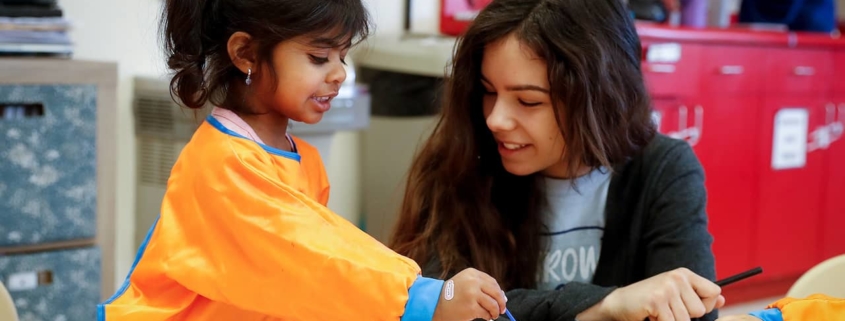Every parent wants what is best for their child. Whether it’s providing a stable home environment for them to learn in, finding the best schools, or providing long-term guidance, parents seek solutions that accumulate into long-term benefits for their child(ren). Deciding whether or not to enroll them in a preschool education program is a decision worth thinking about.
However, though preschool is considered the starting point of a child’s education, not all parents are on board with this idea. Some opt to keep their child at home until they reach Kindergarten age. To help you make a more informed decision about your child’s education, we compiled this guide on the benefits of preschool vs. staying home.
Seven Advantages of a Preschool Setting
Preschool education can do wonders for your child’s development, resulting in academic, social, and cognitive benefits. Let’s explore the seven advantages of preschooling.
1. Improves social skills
Children placed in preschool find themselves in unfamiliar settings away from the comforts of their homes. While this may sound scary at first, placing your child in an active environment with other same-aged peers can help them develop critical social skills. They learn to communicate with others, initiate play time, and display appropriate behavior in a given situation.
For example, if a teacher makes a small request for a child to clean up a play station, that child will respond accordingly without giving into temper tantrums. The sharpness of their interactive skills can result in long-term benefits as they progress through their childhood.
2. Promotes physical behavior
Motor skills are essential for child development. Everything infants and young children do require some form of physical movement. In a preschool setting, children learn the basics of holding down a crayon or pencil, making simple drawings, and using their hands to play with blocks or other toys. They start to understand the connection between their minds and bodies.
Furthermore, motor skill development opens up opportunities for learning, like forming new interactions with objects through the use of manual skills.
3. Helps them adjust to Kindergarten
It goes without saying some children find it incredibly difficult to adjust to Kindergarten. Preschool can help ease the transition to Kindergarten by exposing children to the workings of a classroom environment. By the time they make the transition to Kindergarten, they’ll have a rudimentary understanding of academic topics, including math, language, writing, and geography.
Furthermore, a child who goes through a preschool system is more likely to be emotionally ready for Kindergarten. A stay-at-home child will find it more difficult to cope with the overwhelming feeling of being in an unfamiliar environment.
4. Contributes to cognitive development
Preschool is essential for a child’s cognitive development. Children placed in a preschool environment utilize their imagination to gain a better understanding of the world around them. The more they play and interact with their peers, the easier it becomes for them to develop patterns, test their knowledge, and find solutions to everyday problems.
5. Encourages self-discipline behavior
Not surprisingly, rebellious behavior is common among young children. Every parent knows the struggles of dealing with a child who refuses to follow simple requests, like washing their hands before dinner. Pre-K kids learn to view adults as authority figures. They learn to follow commands such as raising their hand, putting their toys away, and expressing gratitude by saying thank you.
6. Increases future literacy competency
Here is an interesting finding by the U.S. Department of Education: children in high-quality preschool programs are more likely to develop high literacy skills. Furthermore, preschools can also prevent children from falling behind academically, ensuring that they keep up with their peers. This, in turn, can lead to long-term academic benefits such as graduating from high school and college.
7. Promotes compassion
Last, but certainly not least, preschool can help children develop compassion towards others, especially their peers. As children interact with each other in a highly-active environment, they start to observe behaviors, attitudes, and reactions from those around them. This will give them an opportunity to learn how to respond accordingly and think about others in delicate situations.
Is Preschool Worth It?
As you can see, preschool is more than just standard education. It is the first step towards a brighter and more productive future. Children gain skills, create friendships, and take their first meaningful steps into the real world. So, is preschool worth it? We believe it is. However, in the end, only you can decide in the best interest of your child.
Explore Preschool Programs With Cadence Education
Now that you are well informed about the benefits of preschool vs. staying home, it is time to dig deeper into your child’s education. At Cadence Education, we go the extra mile in shaping a child’s future. We make it our mission to establish a homelike environment to enhance student access, ensuring your child feels supported every step of the way.
Find a preschool program today!

